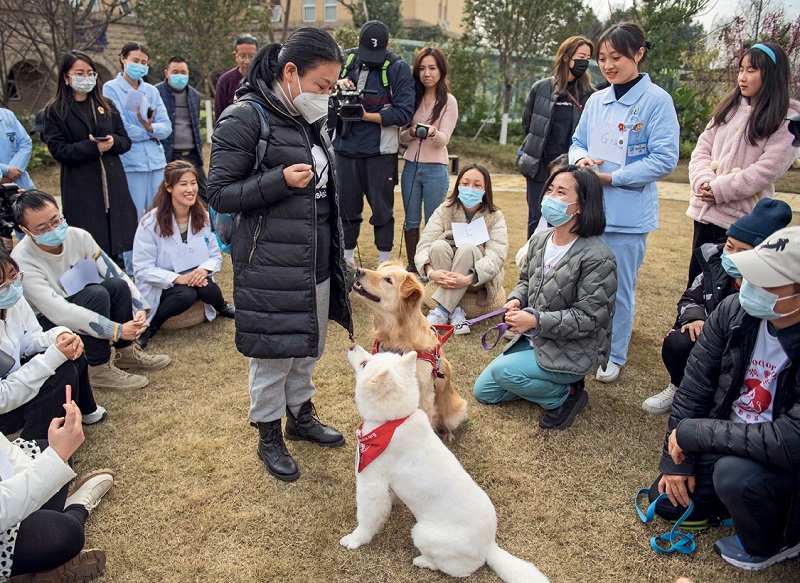Mental well-being — the capacity to feel good about oneself and the word in general — is crucial to human physical health, quality of life, and hence to overall socio-economic development.
Hong Kong-born singer Coco Lee’s fans and fellow entertainers expressed shock and disbelief on July 5 when the news broke that, after losing her years-long struggle with depression, she had ended her life by suicide. The 48-year-old musician, actress, singer, and dancer had released 18 albums in Mandarin, Cantonese, and English. Her live rendition in 2001 of A Love Before Time, theme song of film director Ang Lee’s Oscar-winning Crouching Tiger, Hidden Dragon, made her the first person of Chinese descent to perform at the Academy Awards.
“How could such a bubbly, radiant lady suffer from depression?” was one of the many astounded reactions posted on Lee’s Weibo page. “It never occurred to me that Lee, with her infectious smile and sunny disposition, could be so afflicted,” wrote another.
Others, due to their own experience, were less thunderstruck at the tragedy. Among them was Cui Yongyuan, host from 1996 to 2002 of the then CCTV talk show Tell It Like It Is, and whose quick wit and dry humor brought him national fame. Cui faded from public view after losing his own protracted battle with depression. Lee’s death triggered his revelation on social media of the self-loathing that compelled his own several attempts at suicide. “The last one almost succeeded,” Cui recalled. “I felt only bitter disappointment after regaining consciousness and seeing all the tubes attached to me.”

The Chengdu Center for Mental Health welcomes two therapy dogs on February 9, 2023, having become the first center in Sichuan Province to launch animal-assisted therapy for mental health last September.
Common yet Little Known
Depression, also known as major depressive disorder, is a common, often serious, mood disorder. WHO estimates show that it affects about 350 million people worldwide, a number that has yearly risen by 18 percent over the past decade, and kills around one million each year. People in China afflicted with this condition exceed 95 million, or one in every 14, according to a 2022 blue paper on Chinese citizens’ mental health.
The paper also highlights the alarming trend whereby this phenomenon is affecting growing numbers of young Chinese: half of its 6,670 survey samples of people diagnosed with depression were students, and 30 percent were less than 18 years old. Some researchers believe that many of the adults with this condition have actually displayed symptoms since adolescence. The students affected cited tense interpersonal relations (77 percent) and poor relationships with parents (69 percent) as the primary causes of stress.
Women are at a higher risk of depression than men. Up to 68 percent of those the blue paper surveyed were female, double the male share, and one in every five first-time mothers suffered from post-natal depression.
Despite such prevalence, however, the general public have scant knowledge about this mental disorder. Many perceive it as ill humor, excessive touchiness, or plain feeble-mindedness. Some of those interviewed assume that depression occurs only among the underprivileged in social sectors where access to food, housing, and other basic necessities is problematic.
The South China Morning Post published on July 7 an article titled, “The Tragedy of Coco Lee Calls on Us to Combat This Agonizing Disease.” It warned of this all-too-common mental disorder’s potential to ruin lives. “It may be difficult for an outsider to comprehend that a successful person who is also a celebrity and commands the admiration of millions could be suffering depression so severe that ending their own life seems the sole escape from it. If any solace can be dredged from these tragedies, it is that they raise public awareness of depression as a disease that afflicts people from all walks, as the case of Coco Lee shows,” the article concluded.
Raising Awareness
Growing media attention has helped to demystify this menace to mental health. Government publicity campaigns and actions by relevant institutions and activist groups are also helping to dissolve misconceptions about and raising awareness of this pernicious issue.
On the annually observed October 10 World Mental Health Day in 2022, China’s National Health Commission launched a slew of publicity activities under the theme “Cultivating an enabling environment, working together to improve mental health.” Aiming to expand public understanding of mental well-being needs and cultivate a supportive environment in homes, schools, workplaces, and communities, they included free lectures held in public hospitals and schools and on residential sites.
Nonprofit advertising on popular social media platforms has also diffused the message to more people. Short videos about overcoming mental problems and rallying care and support for those affected are available on Bilibili, Tencent, and Youku, among other Internet media giants. During the summer break, primary and middle schools around the country organized psychology training sessions for their staff focused on honing their ability in timely detection of mental issues among students and provision of essential help where needed.
Lin Lu, a member of Chinese Academy of Sciences and president of the Peking University Sixth Hospital said at a National Health Commission press conference in 2022 that cases of depression in China had steadily increased over recent years. He attributed this to two factors: first, encroaching uncertainties wrought by economic and societal changes, more demanding workloads, and acts of nature, like the COVID-19 pandemic and natural disasters, which assail human emotions sufficiently to preempt depression; and second, as the government and an increasing number of citizens have greater awareness of this health issue, more cases are identified.

An art exhibition promoting awareness of mental health through the artwork of 80 different artists opens in Shanghai on August 10, 2021.
Taking Action
WHO statistics show that, globally, depression and anxiety account for the loss of an estimated 12 billion working days each year, equivalent in lost productivity to US $1 trillion. China’s price tag in this respect is around RMB 49.4 billion per year. A WHO-led study shows that every US $1 invested in scaling up treatment for depression and anxiety generates a US $4 return in the form of better health and hence work ability.
A study of Chinese people aged 30-79 living with depression showed that about one third — 43.31 percent for men and 31.35 percent for women — sought neither public support nor psychotherapy, and that less then 10 percent took medication. This phenomenon is not unusual in developing countries.
But change is underway. The focus of one chapter of the central government’s Healthy China Initiative 2019-2030 is on improvements to mental well-being. As a follow-up action, in 2020 the National Health Commission formulated a work plan on the prevention and treatment of depression which laid out six key tasks. They include: expanding public education through inter-agency cooperation; expanding, through online and off-line resources, screening and assessment at hospitals, physical examination centers, and higher education institutions; building up early diagnosis and treatment capacity, establishing more psychiatry and psychology departments in all types of hospitals, including those specializing in TCM, and increasing training for non-psychiatric doctors; intensifying intervention in regard to priority groups, such as youth, expectant and new mothers, senior citizens, and people in high-stress employment; opening up more helplines; and establishing professional teams equipped to deal with psychological crises.
In July this year, the Ministry of Education and 16 other agencies issued an action plan (2023-2025) on enhancing and improving work on students’ mental health. It states that, by 2025, up to 95 percent of Chinese schools will employ full-time or part-time psychologists, and that 60 percent of community-based educational support stations will provide mental health services. The plan also requires that schools include psychology in their curriculum, commits to stepping up the training of psychologists and psychological research, and encourages community workers and volunteers to provide young people with psychological counseling.
Shortages of psychiatrists and specialist psychiatric clinics have made giving patients the medical care they need problematic. Chinese Center for Disease Control and Prevention data show that, as of the end of 2005, there were only 572 psychiatric service providers and 16,383 psychiatrists throughout China. Marked progress, however, has since been made.
The National Health Commission disclosed at a press conference in August 2022 that, thanks to prioritized training in recent years for psychiatrists, as well as that also needed for general practitioners and pediatricians, their numbers in China had, as of the end of 2021, reached 64,000 — a 173 percent increase over 2012. Meanwhile in about 80 percent of Chinese counties (and county-level cities) there is at least one specialized psychiatric hospital or a psychiatric department at a general hospital.
More To Be Done
There remains an imbalance in China as regards the distribution of medical resources, including those for psychiatry. This is evident in the wide gaps between both different regions and urban and rural areas.
In July 2022 the National Health Commission announced its establishment of the National Center for Mental Disorders. It consists of leading specialist hospitals located in Beijing, Shanghai, and Changsha of Hunan Province in central China. Many psychiatrists hailed the move due to its anticipated role of spearheading and facilitating progress in more regions. “The establishment of this center will undoubtedly improve China’s overall capacity for diagnosing and treating psychiatric disorders, and effectively alleviate the imbalance in the distribution of medical resources,” Lu Lin, a member of the Chinese Academy of Sciences and president of the Peking University Sixth Hospital, told the media.
Cost is one of the reasons why some people suffering from depression balk at seeking adequate medical care. From a few hundred yuan to RMB 10,000 or more per month, the figure varies widely according to each person’s individual circumstances, medical needs, and insurance schemes. Many antidepressants are covered by basic medical insurance, which now covers more than 95 percent of the Chinese population. But some are not. A young patient surnamed Bin said that upon a change of prescription the portion he needed to pay out of his own pocket soared from 10 percent to the full amount. Psychological counseling is even more costly: the sessions he attended over the past years ranged from RMB 100 to RMB 300 per hour. But people he knew in his community were charged triple those rates or more.
Certain law makers and political advisors attending the “Two Sessions”— the annual meetings of the National People’s Congress (NPC) and the Chinese People’s Political Consultative Conference (CPPCC) — have in recent years proposed including psychotherapy in basic medical insurance coverage. At the 2023 NPC session, for instance, Zhong Can, a deputy and doctor from Guangxi Zhuang Autonomous Region, raised this issue once more.
It is now recognized that depression is a chronic disease, caused by physiological, psychological, and societal factors, and must be treated through a multi-pronged approach over an extended period. To achieve meaningful progress in combating this disorder, therefore, we must establish a society-wide care and support system that pools the strength of individuals, families, educators, employers, and the government, as well as of public and non-governmental organizations.